Unit 3 Could you please clean your room?Section B 2a-self check 课件(共36张PPT)
文档属性
| 名称 | Unit 3 Could you please clean your room?Section B 2a-self check 课件(共36张PPT) | 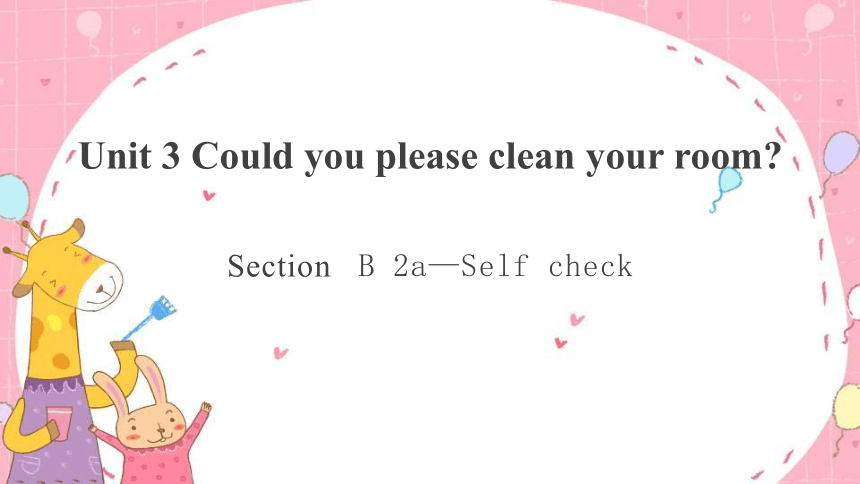 | |
| 格式 | pptx | ||
| 文件大小 | 960.9KB | ||
| 资源类型 | 教案 | ||
| 版本资源 | 人教新目标(Go for it)版 | ||
| 科目 | 英语 | ||
| 更新时间 | 2022-05-17 20:54:51 | ||
图片预览

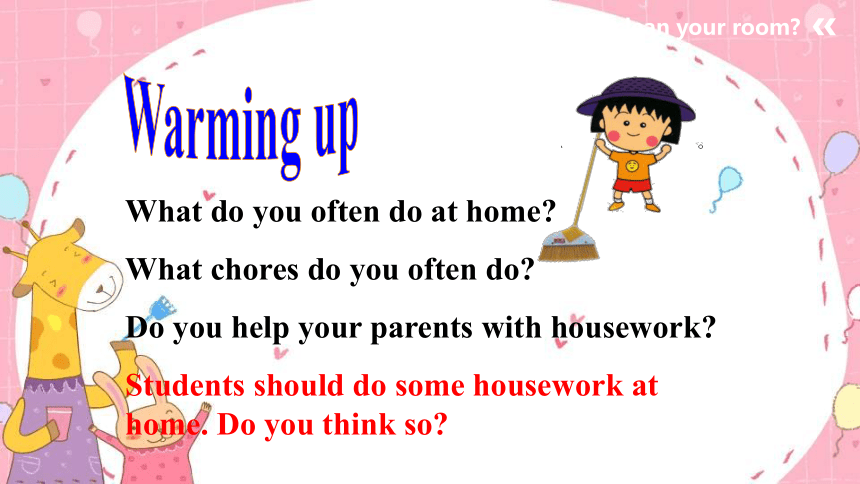
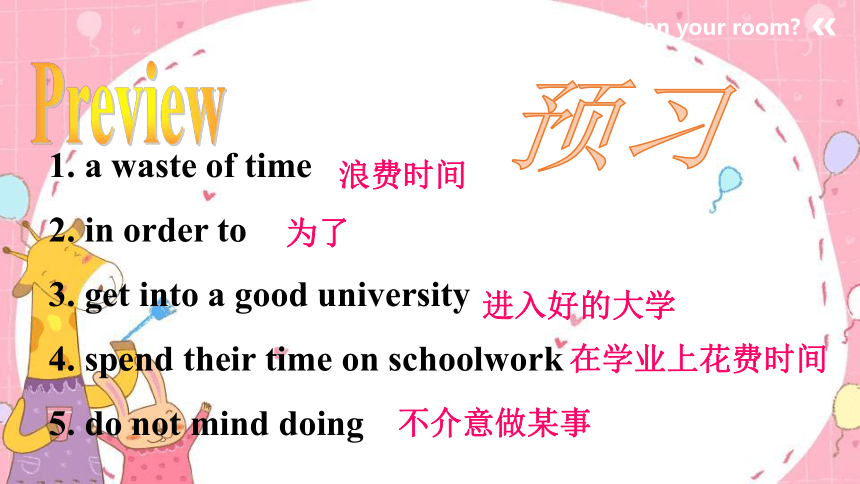
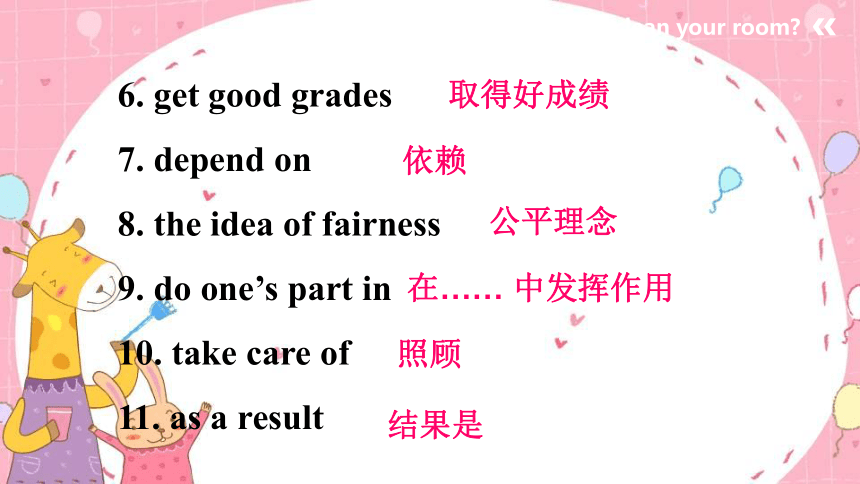
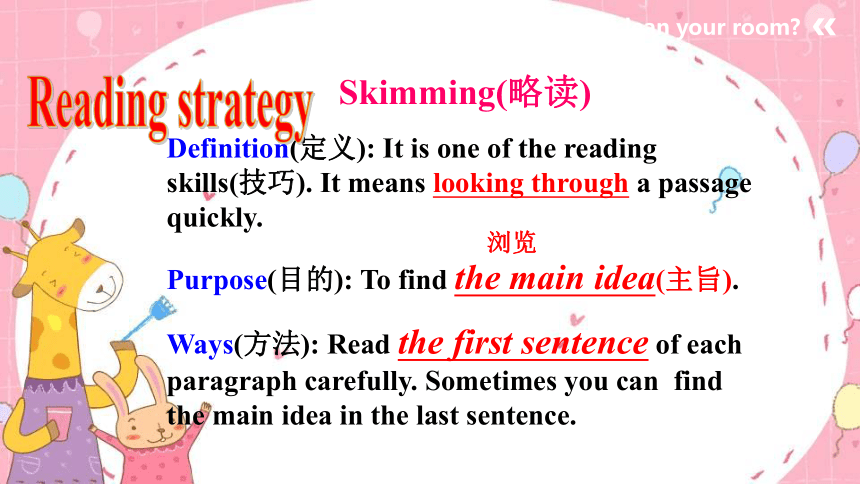
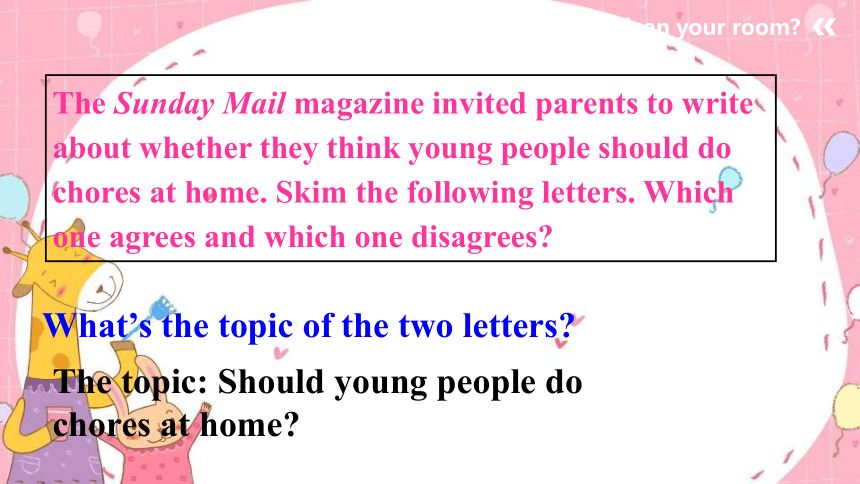
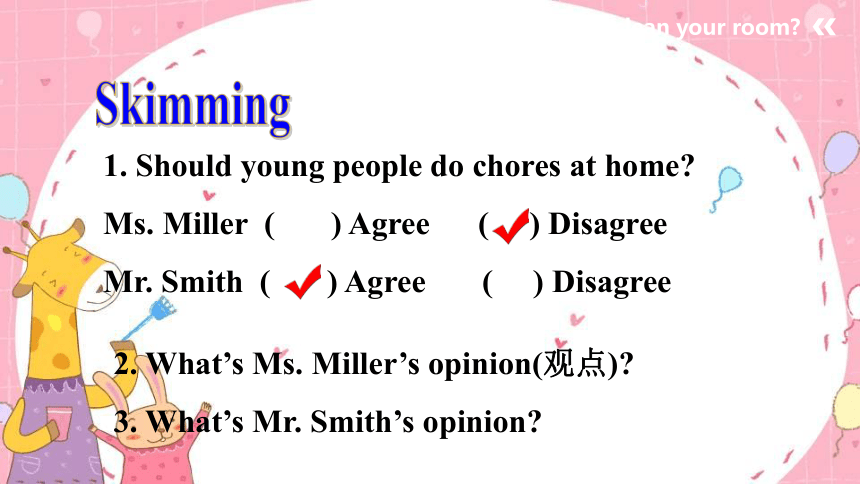
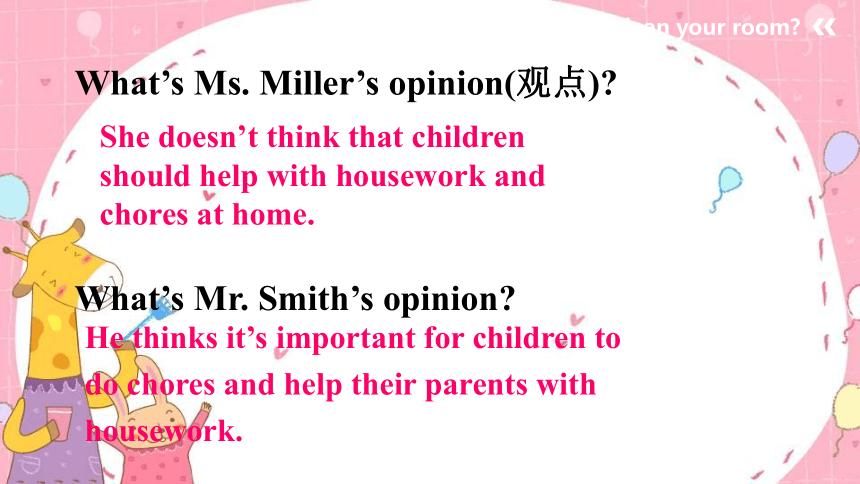
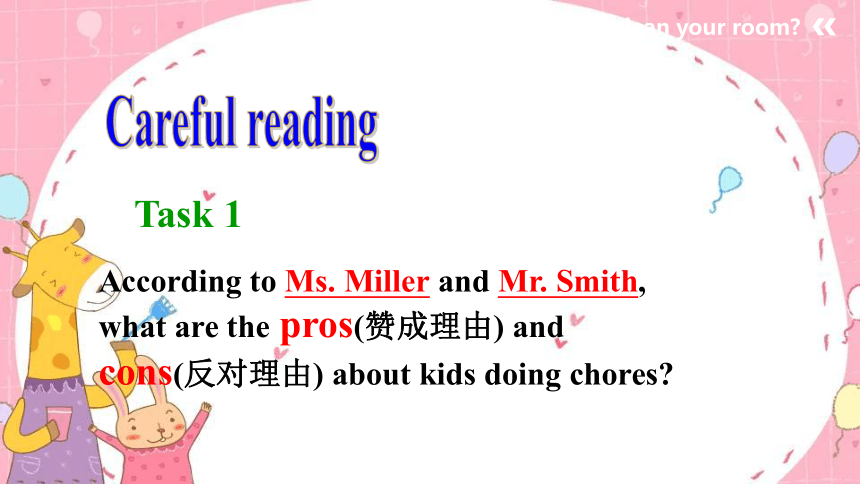
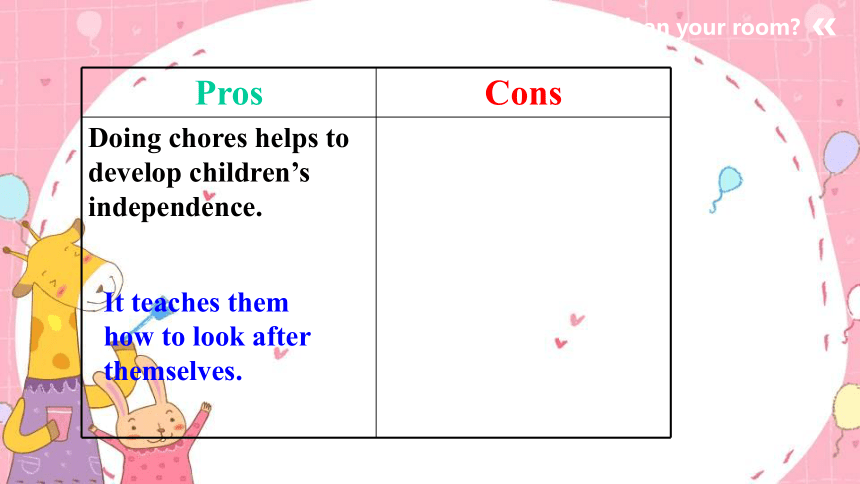
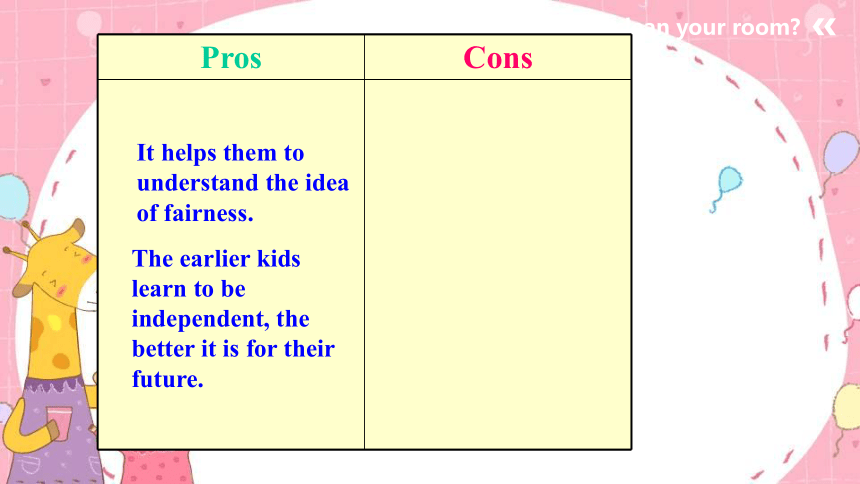
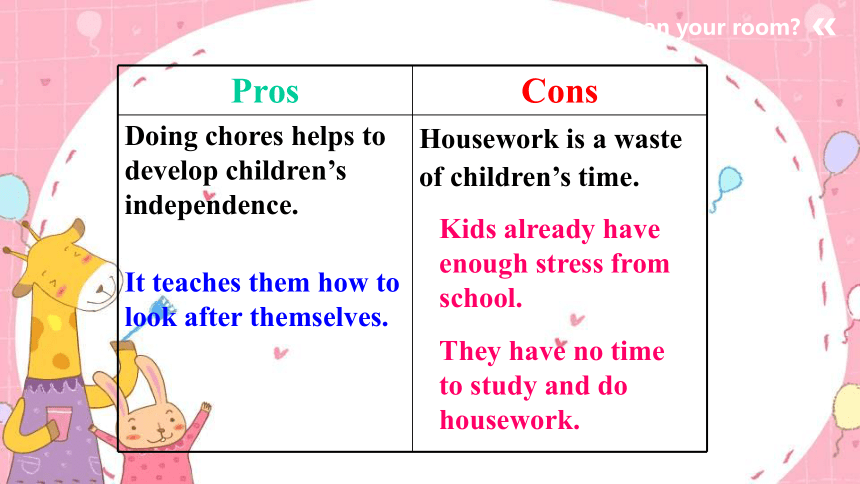
文档简介
(共36张PPT)
Unit 3 Could you please clean your room
Section B 2a—Self check
Could you please clean your room
Warming up
What do you often do at home
What chores do you often do
Do you help your parents with housework
Students should do some housework at home. Do you think so
Could you please clean your room
Preview
1. a waste of time
2. in order to
3. get into a good university
4. spend their time on schoolwork
5. do not mind doing
预习
浪费时间
为了
进入好的大学
在学业上花费时间
不介意做某事
Could you please clean your room
6. get good grades
7. depend on
8. the idea of fairness
9. do one’s part in
10. take care of
11. as a result
取得好成绩
依赖
公平理念
在…… 中发挥作用
照顾
结果是
Could you please clean your room
Skimming(略读)
Definition(定义): It is one of the reading skills(技巧). It means looking through a passage quickly.
Purpose(目的): To find the main idea(主旨).
Ways(方法): Read the first sentence of each paragraph carefully. Sometimes you can find the main idea in the last sentence.
Reading strategy
浏览
Could you please clean your room
The Sunday Mail magazine invited parents to write about whether they think young people should do chores at home. Skim the following letters. Which one agrees and which one disagrees
What’s the topic of the two letters
The topic: Should young people do chores at home
Could you please clean your room
Skimming
1. Should young people do chores at home
Ms. Miller ( ) Agree ( ) Disagree
Mr. Smith ( ) Agree ( ) Disagree
2. What’s Ms. Miller’s opinion(观点)
3. What’s Mr. Smith’s opinion
Could you please clean your room
What’s Ms. Miller’s opinion(观点)
What’s Mr. Smith’s opinion
He thinks it’s important for children to do chores and help their parents with housework.
She doesn’t think that children should help with housework and chores at home.
Could you please clean your room
Careful reading
According to Ms. Miller and Mr. Smith, what are the pros(赞成理由) and cons(反对理由) about kids doing chores
Task 1
Could you please clean your room
Pros Cons
Doing chores helps to develop children’s independence.
It teaches them how to look after themselves.
Could you please clean your room
Pros Cons
It helps them to understand the idea of fairness.
The earlier kids learn to be independent, the better it is for their future.
Could you please clean your room
Pros Cons
Doing chores helps to develop children’s independence. It teaches them how to look after themselves. Housework is a waste of children’s time.
Kids already have enough stress from school.
They have no time to study and do housework.
Could you please clean your room
Pros Cons
It helps them to understand the idea of fairness. The earlier kids learn to be independent, the better it is for their future.
They should spend their time on schoolwork.
When they get older, they will have to do homework.
It is the parents’ job to provide a clean and comfortable environment at home for their children.
Could you please clean your room
Task two
Find out the difficult sentences in the passage.
Could you please clean your room
1. It is the parents’ job to provide a clean and comfortable environment at home for their children.
(1)固定的句型:
It is one’s job (duty, …) to do sth.
“做某事是某人的工作(职责等)”。例如:
汉译英:帮助学生是老师的工作。
—————————————————
It is teachers’ job to help students to learn.
Could you please clean your room
(2)provide 作动词,意为“ 提供;供应”。
provide sb. with sth.或provide sth. for sb.
意为“为某人提供某物”。
汉译英:
他们提供给他钱和食物。
They provide him with money and food.
They provide money and food for him.
Could you please clean your room
2. They should spend time on schoolwork in order to get good grades and get into a good university.
为了取得好分数进入一个好大学,他们应该把时间花在学业上。
spend 表示“花费” (过去式: spent )
Sb. spend time/ money on sth.
(2)Sb. spend time/ money in doing sth.
某人在某事上花费时间(或金钱)
某人花费时间(或金钱)做某事
Could you please clean your room
Question
观察这些句子,除了spend 以外还有哪些词语表示“花费”?这些词语之间有什么用法上的区别?
1. It takes them two hours to finish their homework.
2. Finishing the homework cost them two hours.
3. I have to pay one dollar for this pen.
It takes sb. + time/ money +to do sth.
Sth./ Doing sth. costs (sb. )+ time
pay (sb. ) money for sth. 花钱买……
Sth. costs (sb.)+ time / money
Could you please clean your room
Translation
买这只新手表花了他100美元。(注意时态和人称)
He spent 100 dollars on this new watch.
He spent 100 dollars (in) buying this new watch.
It took him 100 dollars to buy this new watch.
Buying this new watch cost him 100 dollars.
This new watch cost him 100 dollars.
He paid 100 dollars to buy this new watch.
Could you please clean your room
3…… it is important for children to learn how to do chores and help their parents with housework.
我认为对孩子来说学会怎样做杂务和帮助父母干家务是重要的。
句型结构:
It is + adj. +(for sb.)+ to do sth.
表示“对于某人来说,做某事是……的”
Could you please clean your room
1.对于一个孩子来说,要完成这项工作很难。
2.对于学生来说,学好英语是很重要的。
3.对于我来说,多喝水是很必要的。
Could you please clean your room
4. The earlier kids learn to be independent, the better it is for their future.
孩子们越早学会独立, 对他们的未来就越好。
“the+比较级+……, the+比较级+……”
表示“越……, 就越……”。如:
The more a person reads, the more clever he will become.
一个人书读得越多, 就会变得越聪明。
Could you please clean your room
1. The more you smile, the ______ you will feel.
happy B. happier
C. happily D. more happier
2. ______ you work, ________ grades you will make.
A.The harder; better B.Harder; the better
C. The harder; the better
B
C
Could you please clean your room
Discussion
Do you think children should do some chores at home Why or why not Discuss this with a partner and take notes.
Children should do chores because… Children should not do chores because…
Could you please clean your room
Writing
Write a letter to the Sunday Mail and
express your opinion.
Dear Sir or Madam,
I think /believe that ________________.
I agree/disagree that ________________.
I think it is fair/unfair for children to __________________________________.
I think children should/should not ____
Could you please clean your room
because __________________________.
For example, they should/
should not ________________________
because __________________________.
Yours truly,
__________
Could you please clean your room
1. 信头:发信人地址和日期。
有时可省去发信人地址,但一般要写日期。放在信纸的右上方。
2. 称呼:对收信人的尊称。
常用Dear,后用名字,而Mr,Mrs,Miss后不能单独用名字,而是姓或姓与名,如:John Smith的称呼,是Mr Smith,Mr John Smith或 Dear John。称呼后用逗号。
3. 正文。
写作指导
Could you please clean your room
4. 结尾:发信人对收信人的谦称或敬语。放在信的右下方。要特别注意英语习惯,不可根据汉语意思写“此致敬礼”、“祝您健康”之类的中国式的结尾语。
写给同龄人或年长的朋友: Yours sincerely,Yours等等。
写给亲朋好友: Love,Best wishes等等。
5. 签名:一般在结尾语的下面一行。
Could you please clean your room
常见的私人信件的开头方式:
高兴:I was so glad/pleased/happy to receive your letter.
感谢:Thank you for your wonderful gift / your interesting letter.
关心与询问:How are you these days?/ How are you getting on these days?/ How are you getting on with your work/studies?
抱歉:I am sorry that I did not write to you sooner but I have been very busy these days.
Could you please clean your room
一般在表示道歉没有及时给对方写信
时,还要简述原因或写上安慰的话。
遗憾:I was sorry to learn that you did not do well in the examination. / I was so upset to hear that you are ill these days. I do hope you are getting better.
Could you please clean your room
help with housework and chores at home
have enough stress from school
spend the time on school work in order to…
There is no need for them to…
It is important for sb. to do sth.
It’s not enough to…
develop children’s independence
The more…, the more…
Useful phrases
Could you please clean your room
Make a list of chores using these
verbs.
1. do _______________________
2. clean _____________________
3. make _____________________
4. fold _______________________
5. sweep ____________________
6. take out ___________________
Self check
do the dishes
clean the living room
make your bed
fold your clothes
sweep the floor
take out the rubbish
Could you please clean your room
Are these polite requests or
permissions Write the numbers in
the correct places in the chart.
1. Could you please do your homework
2. Could I watch TV
3. Could you take out the rubbish first
4. Could I use your computer
5. Could I leave now
6. Could you come back before nine
Could you please clean your room
Requests
Permissions
2
4
5
1
3
6
Could you please clean your room
Use the questions in activity 2
to write a conversation.
A: _______________________
B: _______________________
…
谢 谢!
Unit 3 Could you please clean your room
Section B 2a—Self check
Could you please clean your room
Warming up
What do you often do at home
What chores do you often do
Do you help your parents with housework
Students should do some housework at home. Do you think so
Could you please clean your room
Preview
1. a waste of time
2. in order to
3. get into a good university
4. spend their time on schoolwork
5. do not mind doing
预习
浪费时间
为了
进入好的大学
在学业上花费时间
不介意做某事
Could you please clean your room
6. get good grades
7. depend on
8. the idea of fairness
9. do one’s part in
10. take care of
11. as a result
取得好成绩
依赖
公平理念
在…… 中发挥作用
照顾
结果是
Could you please clean your room
Skimming(略读)
Definition(定义): It is one of the reading skills(技巧). It means looking through a passage quickly.
Purpose(目的): To find the main idea(主旨).
Ways(方法): Read the first sentence of each paragraph carefully. Sometimes you can find the main idea in the last sentence.
Reading strategy
浏览
Could you please clean your room
The Sunday Mail magazine invited parents to write about whether they think young people should do chores at home. Skim the following letters. Which one agrees and which one disagrees
What’s the topic of the two letters
The topic: Should young people do chores at home
Could you please clean your room
Skimming
1. Should young people do chores at home
Ms. Miller ( ) Agree ( ) Disagree
Mr. Smith ( ) Agree ( ) Disagree
2. What’s Ms. Miller’s opinion(观点)
3. What’s Mr. Smith’s opinion
Could you please clean your room
What’s Ms. Miller’s opinion(观点)
What’s Mr. Smith’s opinion
He thinks it’s important for children to do chores and help their parents with housework.
She doesn’t think that children should help with housework and chores at home.
Could you please clean your room
Careful reading
According to Ms. Miller and Mr. Smith, what are the pros(赞成理由) and cons(反对理由) about kids doing chores
Task 1
Could you please clean your room
Pros Cons
Doing chores helps to develop children’s independence.
It teaches them how to look after themselves.
Could you please clean your room
Pros Cons
It helps them to understand the idea of fairness.
The earlier kids learn to be independent, the better it is for their future.
Could you please clean your room
Pros Cons
Doing chores helps to develop children’s independence. It teaches them how to look after themselves. Housework is a waste of children’s time.
Kids already have enough stress from school.
They have no time to study and do housework.
Could you please clean your room
Pros Cons
It helps them to understand the idea of fairness. The earlier kids learn to be independent, the better it is for their future.
They should spend their time on schoolwork.
When they get older, they will have to do homework.
It is the parents’ job to provide a clean and comfortable environment at home for their children.
Could you please clean your room
Task two
Find out the difficult sentences in the passage.
Could you please clean your room
1. It is the parents’ job to provide a clean and comfortable environment at home for their children.
(1)固定的句型:
It is one’s job (duty, …) to do sth.
“做某事是某人的工作(职责等)”。例如:
汉译英:帮助学生是老师的工作。
—————————————————
It is teachers’ job to help students to learn.
Could you please clean your room
(2)provide 作动词,意为“ 提供;供应”。
provide sb. with sth.或provide sth. for sb.
意为“为某人提供某物”。
汉译英:
他们提供给他钱和食物。
They provide him with money and food.
They provide money and food for him.
Could you please clean your room
2. They should spend time on schoolwork in order to get good grades and get into a good university.
为了取得好分数进入一个好大学,他们应该把时间花在学业上。
spend 表示“花费” (过去式: spent )
Sb. spend time/ money on sth.
(2)Sb. spend time/ money in doing sth.
某人在某事上花费时间(或金钱)
某人花费时间(或金钱)做某事
Could you please clean your room
Question
观察这些句子,除了spend 以外还有哪些词语表示“花费”?这些词语之间有什么用法上的区别?
1. It takes them two hours to finish their homework.
2. Finishing the homework cost them two hours.
3. I have to pay one dollar for this pen.
It takes sb. + time/ money +to do sth.
Sth./ Doing sth. costs (sb. )+ time
pay (sb. ) money for sth. 花钱买……
Sth. costs (sb.)+ time / money
Could you please clean your room
Translation
买这只新手表花了他100美元。(注意时态和人称)
He spent 100 dollars on this new watch.
He spent 100 dollars (in) buying this new watch.
It took him 100 dollars to buy this new watch.
Buying this new watch cost him 100 dollars.
This new watch cost him 100 dollars.
He paid 100 dollars to buy this new watch.
Could you please clean your room
3…… it is important for children to learn how to do chores and help their parents with housework.
我认为对孩子来说学会怎样做杂务和帮助父母干家务是重要的。
句型结构:
It is + adj. +(for sb.)+ to do sth.
表示“对于某人来说,做某事是……的”
Could you please clean your room
1.对于一个孩子来说,要完成这项工作很难。
2.对于学生来说,学好英语是很重要的。
3.对于我来说,多喝水是很必要的。
Could you please clean your room
4. The earlier kids learn to be independent, the better it is for their future.
孩子们越早学会独立, 对他们的未来就越好。
“the+比较级+……, the+比较级+……”
表示“越……, 就越……”。如:
The more a person reads, the more clever he will become.
一个人书读得越多, 就会变得越聪明。
Could you please clean your room
1. The more you smile, the ______ you will feel.
happy B. happier
C. happily D. more happier
2. ______ you work, ________ grades you will make.
A.The harder; better B.Harder; the better
C. The harder; the better
B
C
Could you please clean your room
Discussion
Do you think children should do some chores at home Why or why not Discuss this with a partner and take notes.
Children should do chores because… Children should not do chores because…
Could you please clean your room
Writing
Write a letter to the Sunday Mail and
express your opinion.
Dear Sir or Madam,
I think /believe that ________________.
I agree/disagree that ________________.
I think it is fair/unfair for children to __________________________________.
I think children should/should not ____
Could you please clean your room
because __________________________.
For example, they should/
should not ________________________
because __________________________.
Yours truly,
__________
Could you please clean your room
1. 信头:发信人地址和日期。
有时可省去发信人地址,但一般要写日期。放在信纸的右上方。
2. 称呼:对收信人的尊称。
常用Dear,后用名字,而Mr,Mrs,Miss后不能单独用名字,而是姓或姓与名,如:John Smith的称呼,是Mr Smith,Mr John Smith或 Dear John。称呼后用逗号。
3. 正文。
写作指导
Could you please clean your room
4. 结尾:发信人对收信人的谦称或敬语。放在信的右下方。要特别注意英语习惯,不可根据汉语意思写“此致敬礼”、“祝您健康”之类的中国式的结尾语。
写给同龄人或年长的朋友: Yours sincerely,Yours等等。
写给亲朋好友: Love,Best wishes等等。
5. 签名:一般在结尾语的下面一行。
Could you please clean your room
常见的私人信件的开头方式:
高兴:I was so glad/pleased/happy to receive your letter.
感谢:Thank you for your wonderful gift / your interesting letter.
关心与询问:How are you these days?/ How are you getting on these days?/ How are you getting on with your work/studies?
抱歉:I am sorry that I did not write to you sooner but I have been very busy these days.
Could you please clean your room
一般在表示道歉没有及时给对方写信
时,还要简述原因或写上安慰的话。
遗憾:I was sorry to learn that you did not do well in the examination. / I was so upset to hear that you are ill these days. I do hope you are getting better.
Could you please clean your room
help with housework and chores at home
have enough stress from school
spend the time on school work in order to…
There is no need for them to…
It is important for sb. to do sth.
It’s not enough to…
develop children’s independence
The more…, the more…
Useful phrases
Could you please clean your room
Make a list of chores using these
verbs.
1. do _______________________
2. clean _____________________
3. make _____________________
4. fold _______________________
5. sweep ____________________
6. take out ___________________
Self check
do the dishes
clean the living room
make your bed
fold your clothes
sweep the floor
take out the rubbish
Could you please clean your room
Are these polite requests or
permissions Write the numbers in
the correct places in the chart.
1. Could you please do your homework
2. Could I watch TV
3. Could you take out the rubbish first
4. Could I use your computer
5. Could I leave now
6. Could you come back before nine
Could you please clean your room
Requests
Permissions
2
4
5
1
3
6
Could you please clean your room
Use the questions in activity 2
to write a conversation.
A: _______________________
B: _______________________
…
谢 谢!
同课章节目录
- Unit 1 What's the matter?
- Section A
- Section B
- Unit 2 I'll help to clean up the city parks.
- Section A
- Section B
- Unit 3 Could you please clean your room?
- Section A
- Section B
- Unit 4 Why don't you talk to your parents?
- Section A
- Section B
- Unit 5 What were you doing when the rainstorm came
- Section A
- Section B
- Review of Units 1-5
- Unit 6 An old man tried to move the mountains.
- Section A
- Section B
- Unit 7 What's the highest mountain in the world?
- Section A
- Section B
- Unit 8 Have you read Treasure Island yet?
- Section A
- Section B
- Unit 9 Have you ever been to a museum?
- Section A
- Section B
- Unit 10 I've had this bike for three years.
- Section A
- Section B
